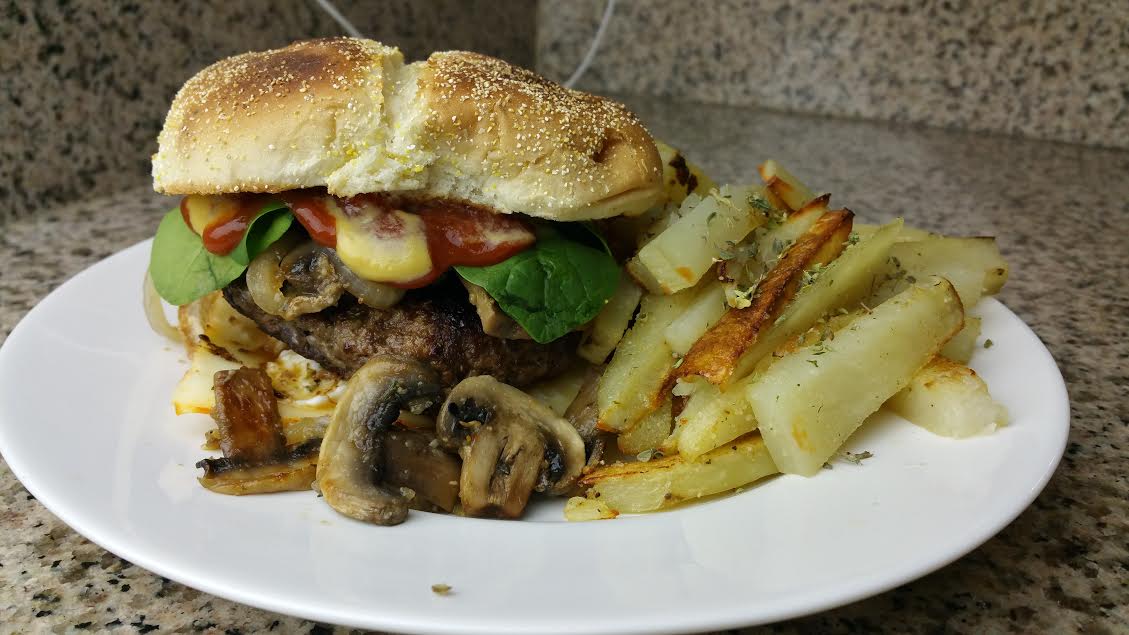By Eric and Chris Martinez
January 2016-
These days it seems we all want the easiest, fastest, least amount of work to put in to attain results. This is a common problem we see on a day-to- day basis in the fitness industry, health industry, contest prep industry, general population, society itself, what have you.
The way we see it is there are two options when it comes to nutrition:
A) You follow some sort of nutrition program whether that be IIFYM, intermittent fasting, ketogenic diet, zone diet, clean eating, paleo, basic nutritional guidelines, or some sort of cookie cutter diet.
B) You don’t follow any kind of nutrition program and just eat whatever the heck you want.
Now, if you are a physique competitor, high level athlete, want to look good naked, and care about your image, then of course you are going to have to follow some sort of nutrition program to get better than average results.
Let’s face it, there is no such thing as the perfect nutrition program. The important question you should ask yourself is “what’s the best nutrition program that’s going to:”
A) Fit my lifestyle
B) Get me my desired results without having to go to extreme measures
C) Be able to adhere to on a consistent basis (days, weeks, months, years)
D) Allow me to incorporate the foods I enjoy eating in moderation
There are pros and cons to every type of nutrition program, but you must find a program where it ensures:
- The pros outweigh the cons
- Makes logical sense for your lifestyle and goals
- Has science to support it
- Something you will adhere to consistently
We are not here to give the pros and cons of each nutrition program, which will be for another article. But we are here to give you some insights on why flexible nutrition could be the nutrition program that’s the simplest, most straight forward, and easiest approach for you to get results. Plus we explain to you why the grass is always greener with flexible nutrition 🙂

Flexible Nutrition and a Sustainable Lifestyle Go Hand in Hand
Schedules, work, family, kids, travel, vacations, and activities play a big role in choosing the right nutrition program for a long-term sustainable lifestyle. With some nutrition programs, you could actually be refrained from some of these things and it’s not 100% your fault.
It’s the way the nutrition program is structured that’s causing these issues.
A 2002 study out of The Journal of Appetite showed an all or nothing, rigid approach to dieting (i.e., meal plan aka cookie cutter type diet) has actually been associated with overeating, increased body weight, and eating disorder symptoms, while a more flexible nutrition approach has shown a stronger association with lower body weight and the absence of depression and anxiety. (1)
As you can see, a very rigid diet such as a meal plan or cookie cutter diet where you’re either on the diet or off can lead to a lot of problems. These diets usually consist of daily eating that includes tilapia and asparagus or chicken with green beans only. This is not a sustainable diet, this will teach you nothing about nutrition or your body, and it will cause problems with schedules, work, family, kids, travel, vacations, and activities. You should not have to suffer on a nutrition program.
With flexible nutrition it gives you the liberty to eat the foods you like, not beat yourself up for not being perfect that day, and allows you to be able to follow a nutrition plan that accommodates schedules, work, travel, family, kids, and activities while attaining results. Flexible nutrition teaches you about foods, your body, micronutrients (vitamins/minerals), macronutrients (calories, protein, carbohydrates, fats), and overall nutrition in general. You don’t have to suffer with flexible nutrition as it becomes a long-term sustainable lifestyle.

Flexible Nutrition and Tracking Your Food Works
At the end of the day we all want a nutrition program that’s going to work and get us results. But these days it’s frightening to see and know what extreme measures people will take to get their desired results. What happens when doing whatever it takes isn’t enough anymore?
Weight loss occurs because of the low energy intake. Any diet can produce weight loss, at least temporarily, if intake is restricted. The real value of a diet is determined by its ability to maintain weight loss and support good health over the long term. The goal is not simply weight loss, but health gains. Most of these fad diets cannot support optimal health over time. In fact, these fad diets can create or exacerbate health problems such as eating disorders, etc. (2)
Some of these nutrition programs are just fads and will do more damage than good. They rarely support good health and habits over the long term.
A 2005 study from The New England Journal of Medicine showed that “lifestyle modification” practices that include keeping daily records of food and calorie intake and physical activity resulted in significant weight loss. These results also confirm previous reports from Klein, Sheard, Pi-Sunyer et al. 2004.
Of the benefits of lifestyle modification (i.e., keeping daily records of food and calorie intake and physical activity) used alone for inducing weight loss. (3)
In a 1993 study from The Journal of Behavioral Therapy showed self- monitoring is necessary for successful weight control. Specifically, the monitoring of: Any food eaten, all foods eaten, time food was eaten, quantity of food eaten, and grams of fat consumed was positively correlated with weight change, while no monitoring at all was negatively associated with weight change. (4)
The above studies support why nutrition dieting and tracking your food works. You have complete control over what you are putting into your body, you’re not excluding food groups, you are not suffering, you are simply counting your macronutrients, eating whole and minimally refined foods, getting adequate micronutrient intakes, and transitioning it into a lifestyle.

Are you Ready to Start Using Flexible Nutrition?
Finding a nutrition program shouldn’t be that complicated. Your body see’s amino acids (protein), glucose (through carbohydrates), lipids (fats), and short chain fatty acid fermentation (through fiber). (5)
Anyone who can tolerate a given food, and truly enjoys the food, should not force the avoidance of it. This strict, all-or-nothing approach to dieting is a recipe for disordered eating in susceptible individuals. We are big believers in respecting your own personal taste preference, and letting that override the rules and formalities of any given fad diet out there.
With flexible nutrition you won’t feel like you’re suffering, you won’t dread your diet, and it won’t affect schedules, work, family, kids, travel, vacations, and activities.
We have incorporated flexible nutrition into all of our clients lives and they have had great success with it, especially with being able to make delicious recipes and not feel guilty after.
Like we said earlier, there are pros and cons to every type of nutrition program, but you must find a program where the pros out weight the cons, makes logical sense for your lifestyle and goals, has science to support it, and something you will adhere to on a day-to-day, week-to week, month-to-month, and year-to-year basis.
We feel flexible nutrition could be the nutrition program that’s the simplest, most straight forward, and easiest approach for you to get results… Plus the grass is always greener with flexible nutrition 🙂
To learn how to implement flexible nutrition into your own fitness program, consider joining team DDT HERE
You have nothing to lose and everything to gain.
References:
1) Smith CF, Williamson DA, Bray GA, Ryan DH. Flexible vs Rigid Dieting Strategies: Relationship with adverse behavioral outcomes. J of Appetite. 1999; Stewart TM, Williamson DA, White MA. Rigid vs Flexible Dieting: Association with eating disorder symptoms in nonobese women. J of Appetite. 2002
2) Whitney E, Rolfes S. Understanding Nutrition. 13th edition. 2013
3) Wadden et al. Randomized Trial of Lifestyle Modification and Pharmacotherapy for Obesity. N. Engl. J. Med. 2005
4) Baker R, Kirschenbaum D. Self-Monitoring May Be Necessary for Successful Weight Control. J of Behavior Therapy. 1993
5) Gropper SS. Advanced Nutrition and Human Metabolism. Sixth edition. 2013
CHECK US OUT ON:

